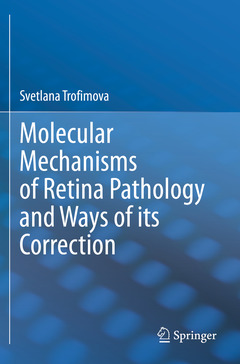Molecular Mechanisms of Retina Pathology and Ways of its Correction, 1st ed. 2020
Auteur : Trofimova Svetlana

This book discusses the pathology of the retina, and reviews current research on the use of cell replacement therapy and short peptides to restore functional activity in retinal neurons. As the book describes, pathologies of the retina, including age-related macular degeneration, diabetic retinopathy, and retinitis pigmentosa, present a long-standing challenge in the practice of clinical ophthalmology. Modern treatment for these conditions, which lead to irreversible blindness, includes laser exposure, surgical intervention, and drugs. These treatments aim to reduce the risk of new complications in the eye; pathogenetic therapy of degenerative diseases of the retina is practically absent in current ophthalmic practice.
The first section of the book reviews the molecular mechanisms of age-related macular degeneration, diabetic retinopathy, and retinitis pigmentosa, and reports on methods of treatment. The second section presents the results of recent experimental studies of the effects of short peptides on pluripotent embryonic cells; on proliferative activity in retinal cells and pigment epithelium; on expression of markers of differentiation or retinal neurons and pigment epithelium; and on the course of hereditary retinal pigmentation in Campbell rats. The third section offers results of clinical studies on the effectiveness of short peptides in patients with macular degeneration, and in patients with retinitis pigmentosa.
The author concludes that the regular use of peptides in the treatment of degenerative diseases of the retina can slow the progression of the pathological process and preserve the patient?s vision for some 10-15 years. In addition, in 80 percent of patients, it is possible to increase visual function by increasing visual acuity, improving the boundaries of the visual field and the fundus.
1.1. Age features of retina
1.2. Current trends in the treatment of degenerative diseases of the retina
1.3. Results of modern scientific research in the field of cell replacement therapy using neuronal stem cells
1.4. Biological effects of peptide bioregulators
1.5. Results of experimental and clinical studies of peptide bioregulators in ophthalmology
Chapter 2. Objects and research methods
2.1. Materials of an experimental study on pluripotent embryonic tissue of Xenopus Laevis clawed frog
2.2. Materials of an experimental study on cell culture of the retina and pigment epithelium of Wistar rats
2.3. Materials of an experimental study in organotypic culture of the retina of the chicken embryo and Wistar rats of different ages
2.4. Materials of an experimental study in rats Campbell with retinitis pigmentosa
2.5. Materials of morphometric studies.Chapter 3. Results of experimental studies
3.1. Results of a study of the induction properties of short peptides on pluripotent embryonic cells
3.2. Effect of short peptides on the proliferative activity of retinal cells and pigment epithelium
3.3. Effect of short peptides on the growth of organotypic tissue cultures of chicken and Wistar rat embryos of different ages3.4. Effect of short peptides on the course of hereditary retinal pigment degeneration of Campbell rats
3.5. Effect of short peptides on the expression of markers of differentiation of retinal neurons and pigment epithelium.
Chapter 4. Clinical studies results
4.1. Clinical characteristics of patients
4.2. Evaluation of the effectiveness of peptide bioregulators in patients with degenerative diseases of the retina
4.3. Conclusion
Svetlana Trofimova (born February 2, 1970) - Doctor of Medical Science, Professor, Deputy Director for scientific and clinical work of the Saint Petersburg Institute of Bioregulation and Gerontology, General Director of Tree of life predictive medicine clinic at the Saint Petersburg Institute of Bioregulation and Gerontology, President of the Russian society for anti-aging medicine since 2012, Vice-President of the European society for preventive, regenerative and anti-aging medicine (ESAAM) since 2019, Secretary General of the World society for preventive, regenerative and anti-aging medicine (WOCPM) since 2016.
Graduated from the Leningrad Pediatric Medical Institute as a pediatrician in 1994.
In 1999 defended her PhD thesis on the topic: "The use of peptide bioregulators in the treatment of diabetic retinopathy".
In 2003 defended her doctoral dissertation on the topic: “Age-related peculiarities of peptide bioregulators regulatory effect on the retinitis pigmentosa”.
Today Svetlana Trofimova is one of the leading specialists in the field of ophthalmology and regenerative medicine.
Svetlana Trofimova is the author of more than 160 scientific papers (monographs, guidelines, articles) and 4 patents. Under her leadership, 5 PhD dissertations were defended. She is the author of a series of popular science books about healthy longevity. "Immortality tomorrow?", successfully presented first in Monaco in 2015, and then in Singapore in 2016, and got admirers among the intellectual elite of Europe and Southeast Asia. In 2018, the book "What prevents us from living to 100 years?" was published, and in 2020, the book "Secrets of a long life" was published.
Svetlana Trofimova has made numerous presentations and lectures at the world conferences on ophthalmology, gerontology and anti-aging medicine.
Svetlana Trofimova is a member of the editorial Board of the Russian scientific journal "Doctor".
Since 2017, she haOffers a thorough review of retinal pathology, and emerging techniques for restoring retina function
Discusses the pathology of age-related macular degeneration, diabetic retinopathy, and retinitis pigmentosa
Reviews current research on the use of short peptides to restore retinal function
Date de parution : 07-2021
Ouvrage de 90 p.
15.5x23.5 cm
Disponible chez l'éditeur (délai d'approvisionnement : 15 jours).
Prix indicatif 147,69 €
Ajouter au panierDate de parution : 07-2020
Ouvrage de 90 p.
15.5x23.5 cm
Disponible chez l'éditeur (délai d'approvisionnement : 15 jours).
Prix indicatif 147,69 €
Ajouter au panier


